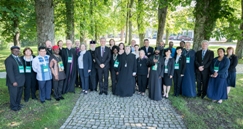WCC's Central Committee Set for Packed Agenda on Unity, Justice and Peace

Contact: World Council of Churches Media Office,
+41 79 507 6363
+41 79 507 6363
GENEVE, June 14, 2018 /Standard Newswire/ -- Observing the 70th anniversary of the founding of the World Council of Churches (WCC) brings special focus and heightened attention to this year's Central Committee meeting, 15-21 June in Geneva. The WCC Executive Committee meets 13-14 June at the Ecumenical Institute of Bossey.
Photo: The WCC Executive Committee gathers in Bossey 13-14 June 2018. Credit: Albin Hillert/WCC
With a densely packed agenda on tap, the chief governing body of the WCC is gathering this week for its biennial meeting, followed immediately by a visit from Pope Francis on 21 June.
Highlighting the 70th, participants will attend a Sunday ecumenical worship service with the congregation of St Pierre Cathedral in Old Town Geneva and enjoy an evening anniversary celebration focused on informal storytelling and presentations from the several regions of the fellowship.
Church leaders from around the world, including His All Holiness Bartholomew I, the Ecumenical Patriarch, are traveling to Geneva for the festivities, and the week will close with the daylong visit of Pope Francis.
But there is also a heavy business agenda. Along with reports from the moderator, Dr Agnes Abuom, and the general secretary, Rev. Dr Olav Fykse Tveit, thematic plenary sessions are devoted to the ongoing and evolving search for Christian unity, re-conceiving ecumenical diakonia, experiences and stories from the pilgrimage, and the shape of the "living fellowship" of member churches today.
Among the Central Committee's chief tasks are a midterm review of the council's programmes, decisions about the venue and theme of the next WCC assembly in 2021, monitoring and evaluating the ongoing foundational work of the Pilgrimage of Justice and Peace, updates on the emerging Green Village real-estate development, reception of the new landmark study of ecumenical diakonia (the churches' service), and addressing a variety of public issues.
As the general secretary noted, "This whole meeting of the Central Committee has been prepared as a comprehensive, significant, public, and quite dense event to commemorate, consider, and celebrate the life and work of the World Council of Churches."
Side events include special gatherings for youth and women and launches of two new books: a new short history of the WCC and its assemblies; and a cross-regional, cross-confessional theological reflection on the pilgrimage.
Elected from among the delegates to the last WCC assembly, in Busan, Republic of Korea, in 2013, the 150-member Central Committee gathers directly after a two-day meeting of its Executive Committee, the 25 members of which were chosen by the Central Committee. It meets every six months and works closely with the leadership to guide the WCC's activities and decisions between biennial Central Committee meetings.
Members of the Central Committee represent nearly 40 percent of the WCC's 348 member churches across a dozen families in world Christianity. Observers from other churches, ecumenical partner organizations, and religious organizations, along with media, staff and stewards, bring attendance to around 300.
The World Council of Churches promotes Christian unity in faith, witness and service for a just and peaceful world. An ecumenical fellowship of churches founded in 1948, today the WCC brings together 348 Protestant, Orthodox, Anglican and other churches representing more than 550 million Christians in over 120 countries, and works cooperatively with the Roman Catholic Church. The WCC general secretary is the Rev. Dr Olav Fykse Tveit, from the [Lutheran] Church of Norway.




 Sign Up to Receive Press Releases:
Sign Up to Receive Press Releases: